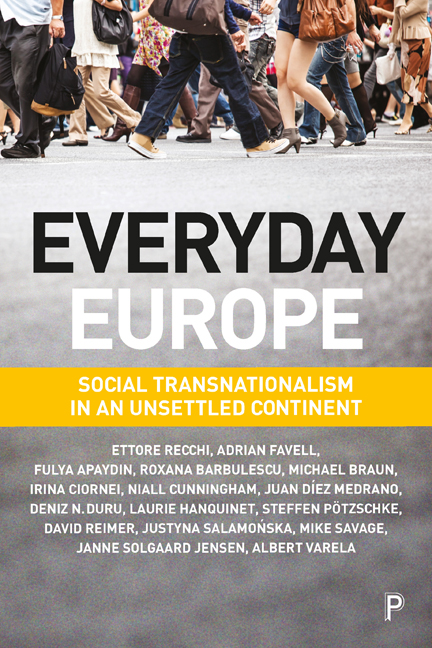Book contents
- Frontmatter
- Contents
- List of tables and figures
- Notes on contributors
- Acknowledgements
- Introduction: Social transnationalism in an unsettled continent
- one Cartographies of social transnationalism
- two The social structure of transnational practices
- three Cultural boundaries and transnational consumption patterns
- four Social transnationalism and supranational identifications
- five Explaining supranational solidarity
- six Narratives and varieties of everyday transnationalism
- seven Understanding Romanians’ cross-border mobility in Europe: movers, stayers and returnees
- eight Transnational Turkey: the everyday transnationalism and diversity of Turkish populations in Europe
- Epilogue Is social transnationalism fusing European societies into one?
- Methodological appendix
- Index
six - Narratives and varieties of everyday transnationalism
Published online by Cambridge University Press: 19 April 2022
- Frontmatter
- Contents
- List of tables and figures
- Notes on contributors
- Acknowledgements
- Introduction: Social transnationalism in an unsettled continent
- one Cartographies of social transnationalism
- two The social structure of transnational practices
- three Cultural boundaries and transnational consumption patterns
- four Social transnationalism and supranational identifications
- five Explaining supranational solidarity
- six Narratives and varieties of everyday transnationalism
- seven Understanding Romanians’ cross-border mobility in Europe: movers, stayers and returnees
- eight Transnational Turkey: the everyday transnationalism and diversity of Turkish populations in Europe
- Epilogue Is social transnationalism fusing European societies into one?
- Methodological appendix
- Index
Summary
Introduction
In this chapter, we will take another look at the data our study provides on what might be conceived as ‘everyday transnationalism’ among ordinary European populations. European integration has provided for an extraordinary range of rights enabling European citizens to benefit from participation in a wide and open European space, whether for economic and business reasons, leisure, tourism and consumption, or in terms of wider knowledge and interest in countries around the region. Transnationalism has become a commonplace possibility of everyday life for ordinary citizens across the continent.
In academic analyses of Europe, however, it has become routine to argue that European integration most benefits elites and upper classes – the people most likely to have international connections – while being of much less benefit to lower classes (Fligstein 2008). This may fuel a certain resentment towards those seen to be better able to take up the opportunities of a more mobile world (Kuhn 2015). In turn, this is linked to the widespread mistrust and (sometimes) hostility among ordinary citizens to the European project in political and identification terms (de Vries 2018). Sociologists (Beckfield 2006), meanwhile, have presented evidence that European integration is causing more inequality in the context of global economic change.
So how has the possibility of mobility been understood and experienced by ordinary Europeans? Freedom of movement, after all, is routinely cited by the EU itself as its most popular achievement (Recchi 2015). Previous chapters have provided a quantitative overview of the cross-border mobility practices of residents living in the six EUCROSS countries. Chapter Two in particular showed significant variation between countries in terms of average levels of mobility, as well as its fundamental social stratification. Including intra-EU migrants and residents of a new member state (Romania) introduces further varieties into the aggregate mix, as well as a certain degree of noise, given the quite different migration and mobility scenarios faced by Turkish or Romanian citizens. Our goal in this chapter is disaggregation, and a focus on understanding qualitatively the positional variation of Europeans in a mobile Europe. For all its complexity in measuring mobilities, the aggregate survey can only tell us so much about how Europeans experience travel, long-distance contacts, experiences and ideas of other places, and so on.
- Type
- Chapter
- Information
- Everyday EuropeSocial Transnationalism in an Unsettled Continent, pp. 171 - 194Publisher: Bristol University PressPrint publication year: 2019

